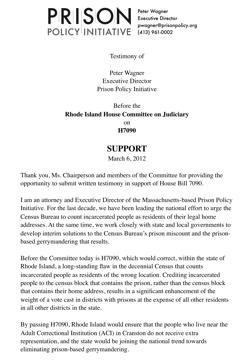Rhode Island considers legislation to end prison-based gerrymandering
Several civil rights organizations submitted testimony to the House Committee on Judiciary in support of House Bill 7090, which would end prison-based gerrymandering in the state.
by Leah Sakala, March 7, 2012
Yesterday several civil rights groups testified before the Rhode Island House Committee on Judiciary in support of House Bill 7090, which would end prison-based gerrymandering in the state.
The legislation would fix the harm caused by the Census Bureau’s prison miscount by requiring that incarcerated people be reallocated to their home addresses in state legislative redistricting data beginning in 2020. The bill would also bring Rhode Island’s redistricting practices in compliance with state law, which explicitly states that a prison is not a residence. By passing HB 7090, Rhode Island would join the growing national trend towards rejecting prison-based gerrymandering.
Organizations that testified in support of HB 7090 included the ACLU of Rhode Island, Common Cause Rhode Island, the Prison Policy Initiative, the Urban League, and Direct Action for Rights and Equality. The written testimonies submitted by the Prison Policy Initiative (testimony) and Common Cause Rhode Island (testimony) are available online.
As advocates pointed out, prison-based gerrymandering is especially problematic in Rhode Island because the state has a single prison complex that’s concentrated in one geographic location. This makes it particularly difficult to diminish the harm of prison-based gerrymandering by splitting the prisons into multiple pieces when drawing legislative redistricting maps.
In the current redistricting cycle, for example, the redistricting commission struggled with how to mitigate the harm of prison-based gerrymandering, and the final maps include a district that is 15% incarcerated. This means that 85 people in that district have as much political clout as 100 people who live in a district without a prison.
There was no opposition to the bill at last night’s hearing. It’s time for Rhode Island to take a stand and pass HB 7090 to ensure that prison-based gerrymandering does not compromise Rhode Island residents’ right to vote after the 2020 Census.




